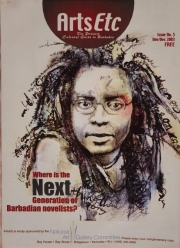
ArtsEtc Inc. 1814-6139
All works copyrighted and may not be reproduced without permission. ©2013 - hoc anno | www.artsetcbarbados.com
All works copyrighted and may not be reproduced without permission. ©2013 - hoc anno | www.artsetcbarbados.com



Published: Nov/Dec 2003
Theme: Where Is the Next Generation of Barbadian Novelists?
Cover: Original mixed media portrait of Barbadian novelist Nailah Folami Imoja by artist Ewan Atkinson.
Contributors: Carolle Bourne, Mark Selman

BackPage Say #5
Time and Timing
By Robert Edison Sandiford
I find my reasons for writing shifting over the years. When in primary and secondary school, I wrote because I liked to make up stories and tell stories and offer my point of view. By the time I reached university, writing for a living seemed inevitable, and the more of others I read, the more I wanted what I wrote to have resonance beyond the page. I write to entertain; to tell it like it is (and like it ain’t); to justify the ways of human beings to each other; to develop style as opposed to fashion; and in the hope that somebody, somewhere, someday, will read my words and simply say, “Wow.”
In an interview with Austin Clarke five years ago, the Canadian-based, Barbadian author observed, “You really are writing for glory, if you can call it that—attention.” Guyanese writer Jan Carew noted, upon receiving a CCLE Lifetime Creative Award in Literary Arts at the June Caribbean-Canadian Literary Expo in Toronto, that “if you live long enough, the accolades do come.”
Writers, somewhat like fools, seldom differ. We all think we’re more deserving than the next scribbler. Where we stand apart is in the urgency of our expression.
Quality takes time and timing. Fifty years ago, the world was ready for In the Castle of My Skin, George Lammings story about a Barbadian “village as collective character.” After four decades of work, Clarke is enjoying the greatest success of his career with his tenth novel, The Polished Hoe.
Most of all, the building of a literary legacy takes production, the kind generated by a seriousness of purpose. Writers with a mission, whatever it may be, don’t wait until they are dying or dead to decide on the kind of works they wish to leave behind. They think on this their entire professional lives.
Unfortunately, the difference between the act of printing and the business of publishing is still largely misunderstood in Barbados. Then there are those writers who think being published by a particular house or winning certain awards means they have arrived. Developing lines of distribution, seeking new markets, protecting the integrity of intellectual property, and remaining humbly engaged by one’s craft—or finding the right people to do these things for you—are very much part of an ongoing creative process.
For all of us, not just the lawyers or the politicians or the cultural officers, the benefits of this “literary activity,” which is a very human activity, are clear: the stories our writers tell, read, stage, record, and preserve are our very own: our truths and myths, our tall tales and boldface lies. They not only reveal to us who we are but why such discovery is so vital to communicate to one another.
Robert Edison Sandiford is the founding editor with Linda M. Deane of ArtsEtc.